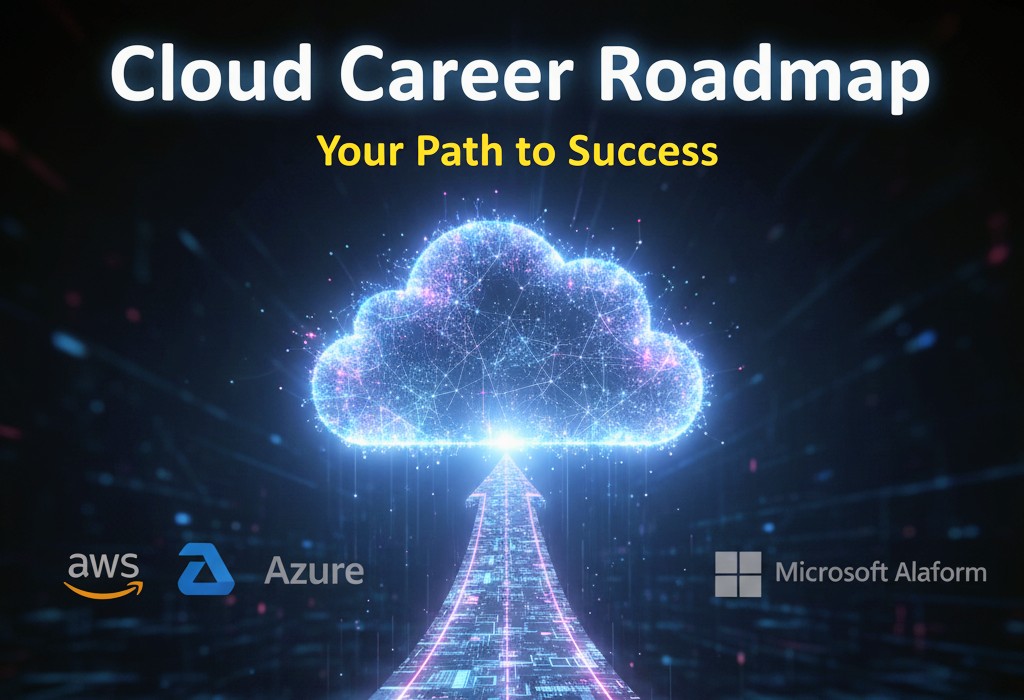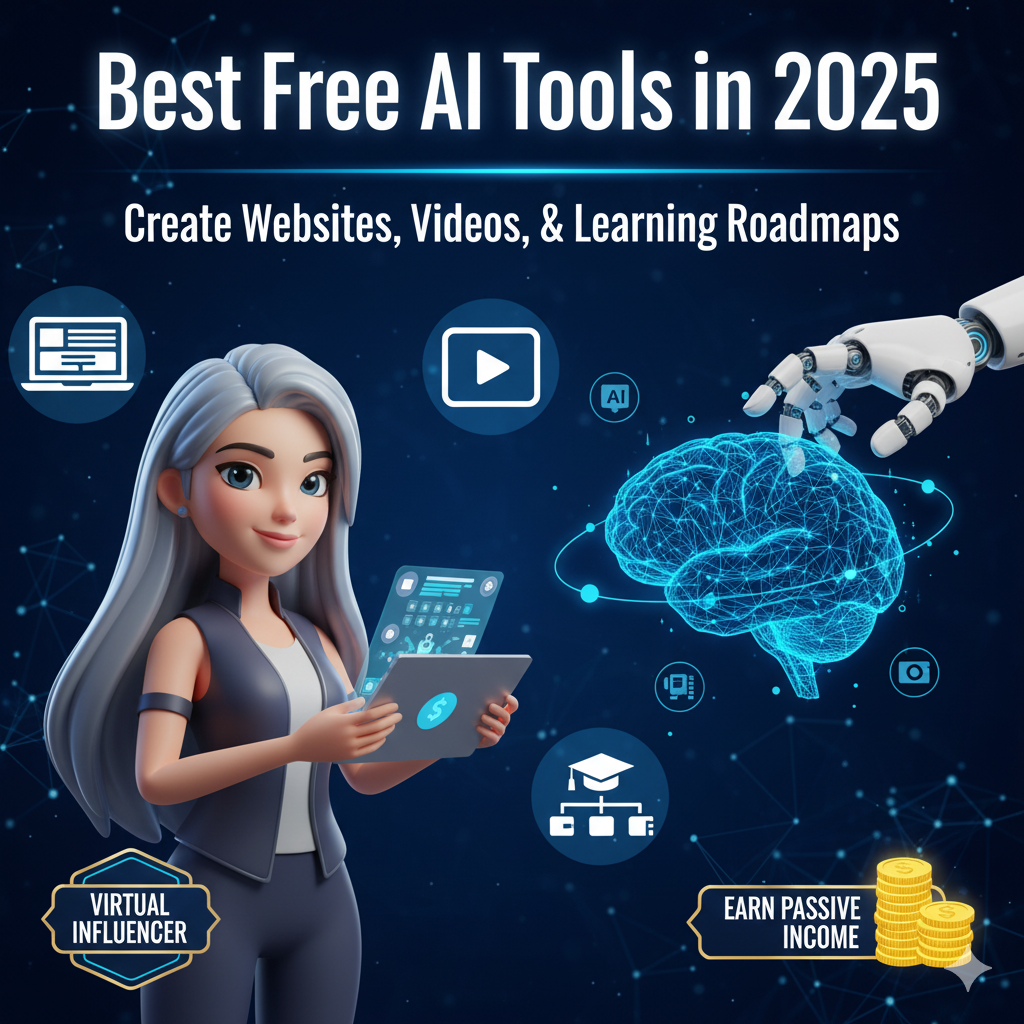Understanding Cloud Computing and Its Market
We are going to discuss in detail about an extensive roadmap to build a great career in the field of Cloud Computing in 2026. Now, many students among us will wish to build a career in the tech field, knowing that we need to pursue programming or coding. For such students, Cloud Computing is a career option.

Whenever we talk about Cloud Computing, any organization this could be a small-scale company, a medium-sized company, or a large organization, an MNC uses a remote on-demand service instead of setting up and maintaining its local servers.
Cloud Computing: The Pay-As-You-Go Advantage
And these remote servers generally work on a ‘pay-as-you-go’ model, meaning the organization only has to pay for the resources it uses, whether they are computing resources or storage resources. And because Cloud Computing is such a lucrative option for organizations, in 202X, many companies use cloud services in their tech infrastructure.
Generally, when we talk about Cloud Service Providers, there are many different providers in the market, but the three major players are: first, Amazon AWS, which has the largest market share. That’s why generally, the maximum skills students learn in Cloud Computing are AWS-related.
Building Strong Cloud Fundamentals
The second largest use in the industry is Microsoft Azure, and the third is GCP (Google Cloud Platform). There are several other players as well, like IBM, but the majority of students who start their journey in Cloud Computing gain a strong command over the resources and services of one of these service providers.
When we want to enter the field of Cloud Computing, the first priority should be to build strong fundamentals. When our core concepts are strong, they will help us a lot later on when we pick up specialization, prepare for certifications, or work on projects. So, the first skill we should have to build good fundamentals should be Networking, specifically computer networking.
Computer Networking: The Core of the CloudKey
- Concepts to Master (Routing, IP Addresses, VPN
- Recommended Resources (Forouzan/Apna College Notes)
We should have extensive knowledge of how routing works in computer networking, how IP addresses work, and how VPN (Virtual Private Network) works. There are many different resources available on the internet to study computer networking; you can study from wherever you understand the fundamentals well.
Acedmy already provided notes on computer networking on Acedmy, which you can refer to. Otherwise, there is this book by the name of Forouzan, which I also referred to for Cyber Security; you can refer to that as well.
Virtualization: Understanding Shared Resources
And the second thing we need to cover for fundamentals is Operating Systems. We should have deep knowledge of operating systems, specifically, we will be gaining knowledge of the Linux OS because often when working on deployment, we use Linux.
The third thing we will be studying in fundamentals will be Virtualization. The basic meaning of virtualization is when we have multiple users but they are using shared resources without impacting each other’s data. In virtualization, we study about VMs (Virtual Machines), hosts, and hypervisors. And basically, virtualization is something we can implement practically ourselves.
The best way to do this would be to set up a virtual machine. We can basically use the knowledge of operating systems and virtualization to do something like this. The easiest way to do this is to set up a free-tier account on AWS, and after that, use the AWS EC2 service and create our own VM on it.
In this, we can actually practically implement many theoretical concepts we learn in virtualization. And this is not just for AWS; if you want to work on Azure services or GCP, the same thing is possible to replicate on those platforms as well.
Databases: The Storage Backbone
And the fourth thing is Databases. Because the maximum organizations that use cloud services also use these services to store their data in some way. That is why having prior knowledge of databases, whether SQL database or NoSQL database, helps us a lot in our long-term journey.
Programming Knowledge (Optional but Recommended)
As soon as we cover our fundamentals, the second step comes. This step is completely optional. Programming knowledge is not required in all fields within Cloud Computing. We learn a programming language so that we can design better solutions and so that our understanding can increase over time. So generally, you can start with a programming language like Python or JavaScript or TypeScript, or any programming language you like, and basically start building logic.
Recommended Languages (Python, JavaScript, TypeScript)
After that, we can start learning services. Generally, when we talk about companies, organizations are either working with a single service provider for example, a company might only be using AWS services or only Azure services or sometimes companies also use hybrid services, meaning they use a mix and match of different services from multiple service providers. In such a situation, as a student, it is best to start with one cloud service provider.
Mastering Cloud Services and Platforms
We have already discussed that the major three providers include Amazon AWS at the top (i.e., the largest market share), meaning maximum companies use AWS. The second largest is Microsoft Azure, and the third largest is GCP (Google Cloud Platform).
Generally, I advise students to start with AWS or Azure because you will find many market opportunities for them. If we are applying for jobs, all cloud service providers generally have Free Tiers available.

Getting Started with Essential Services (EC2 for Compute, S3 for Storage)
That is, as a student, we can create an account and start, where we get a lot of free credits initially so that we can deploy our own things there. For example, AWS, within AWS you get a lot of free credits so that you can use services like EC2 for compute or S3 for storage. So basically, we can start with these two services and gradually practice by deploying our websites there.
Certifications and Validation
And after that, the final stage for us is to get some Certifications. Generally in tech, if we go towards Software Engineering or Software Development, certifications do not have that much importance. But in tech, if we talk about fields like security or Cloud Computing, companies sometimes check our certifications at the fresher level.
Certification vs. Practical Skills: Finding the Balance
This absolutely does not mean that we will get a job just by having a certification and that practical skills are not important. Definitely, certification is only seen on the resume, and after that, your practical knowledge will actually be checked in the interviews.
So we can get certification with the mindset that it will help us in getting our resume shortlisted. For certifications, generally, we can start with an associate-level certificate, which is generally the easiest to clear, and we can start applying for fresher-level roles.
After that, gradually, as our experience builds up over time, we can apply for better certifications like architect level. If you want a detailed discussion on certifications, we have already created a dedicated content on that, which we can explore.
Specialization and Job Roles
After covering the fundamentals, getting certifications, working on some projects, deploying them, and using the services, finally, we can start Applying for Jobs. We can generally start the job as a Cloud Engineer, but over time, we can also build a specialized career for ourselves in the field that interests us more. Within Cloud Computing, there are not just Cloud Engineers; there are many different roles that exist according to specialization.
Cloud Administrator and Cloud Architect
- Cloud Security Engineer
- Infrastructure Engineer
Over time, we can move towards becoming a Cloud Administrator or a Cloud Architect, or we can become a Cloud Security Engineer or an Infrastructure Engineer. In whichever field we want to build specialization for ourselves, we can go and learn more things in that field. In fact, there are many students who start with Cloud Computing but after a few years of experience, shift to the field of DevOps.
Transitioning to DevOps (Advanced Specialization)
To move into DevOps, we can basically start with containerization, we learn Docker, and after that, we can move towards Kubernetes. Besides this, we can work with CI/CD pipelines or we can also learn Serverless Computing, in which we would be learning AWS Lambda, or if we are working on Azure or Google Cloud, we would be learning Azure Functions.
Career Growth and Salary Expectations
Now, these are all the technologies that we need to learn to build a successful career in Cloud Computing. There are two types of companies we can join: either our company can be a service-based company or it can be a product-based company.
And our average package depends on several different factors: which industry we are working in, which organization we are working in, which role we are working for, and most importantly, the average starting package for service companies and the average starting package for product-based companies.
Conclusion: Start Your Cloud Journey Today
Now, these are our average packages, but when we talk about the higher-end packages, very lucrative options are available to us. We can secure very good packages, depending on whether our skills are very good and the company we are applying to has that exact budget for that role.
So, sometimes good students secure packages up to 20 LPA, 30 LPA, in fact, 50 LPA, 55 LPA. So basically, the salary packages are dependent upon your skills. So I hope that we will start working hard on our careers starting today.

